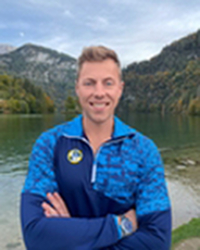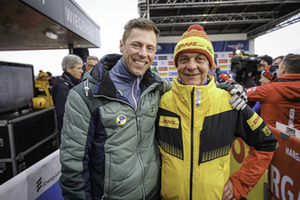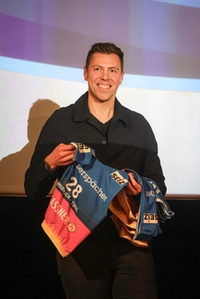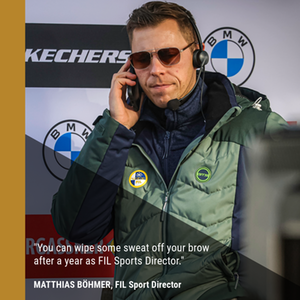One year as sports director: Interview with Matthias Böhmer

Berchtesgaden (FIL/08. Apr. 2024) FIL Sports Director Matthias Böhmer took over this position a year ago. Prior to that, the 33-year-old German was trained for one season by his predecessor Maria-Luise Rainer.
The former luge athlete, bobsleigh pilot, race director and coach has now successfully completed his first season in this management position for the sport of artificial track luge. We asked him how he has fared, what his experiences have been and what his plans are for the future.
Congratulations on your one-year anniversary, Matthias Böhmer. How does it feel after a year as sports director for artificial track luge?
Matthias Böhmer: "You can wipe some sweat off your brow after a year. Sport Director of the FIL is a tough job. If you want to get everything under one roof, make all the coaches and athletes from all the nations happy and satisfy all the organizers and national federations, that's an insane task.
Of course, you can never make everyone happy, and you have to tell your partners often enough that something is not working the way they would like it to. It's a huge task in terms of organization and communication."
What were the biggest challenges you faced during your first year in your position?
Matthias Böhmer: "The biggest challenges were definitely the capricious weather during the last World Cups. The warm weather followed us from track to track. Reacting to this and getting the best out of it for the athletes, but also for the media, was really not easy.
And then it was also a challenge to keep the teams and organizers hungry during all the double events. By the second World Cup on the respective track, the motivation of those involved had already dropped considerably in some cases. Of course, the aim was to keep the level of the event high. That wasn't easy at times."

What changes have you made to the organization or management compared to previous years?
Matthias Böhmer: "Basically, we have tried to change the hierarchical system and focus more on communication and cooperation. With all those involved, with the FIL, the teams, and the organizers, we have tried to strive for an "open-door policy" and to be open to ideas and suggestions.
Flexibility and individuality in the organization and implementation of the individual World Cups was our goal."
Can you tell us about your other goals and important milestones?
Matthias Böhmer: "Basically, we need to be more cooperative, more communicative and more individual. We need to motivate the organizers even more to host individual, independent events, not only for television, but also more attractive for the spectators on site. As the FIL, we can only act in an advisory capacity here. We can support with ideas and contacts. The organizers themselves must find the motivation to create individual, attractive events. If you offer something special for fans, then you also generate more budget through entrance fees. It's a cycle."
Were there any specific strategies or initiatives that you introduced to make international luge more attractive?
Matthias Böhmer: "This is done in very close cooperation with the Technical Director. New luge shoes and a new helmet are to be introduced in the next few years. These are the two points we are currently working on. We must not put the aspect of attractiveness above that of safety and fairness. Basically, we want to create a completely new shoe and helmet design. Apart from that, it is important that the athletes themselves realize that they have to present themselves in the best light."

The warm weather in particular caused problems for winter sports last season. The luge World Cups and World Championships were able to take place, but you had to change the starting order several times together with the race organizers and jury to create the fairest possible racing conditions. How do you look back on these decisions?
Matthias Böhmer: "We should have changed the starting order at the first Oberhof World Cup. However, that was a very far-reaching decision for which we also wanted to protect ourselves legally.
I believe that the change was extremely positive, and not just from a sporting and media perspective. We have also massively upgraded the Nations Cup as a result. We have made it an important race. The Nations Cup starters had one more competition, which is very important for successful participation in the World Cup.
I think this regulation is fairer than before. If you finish in the top five in singles or three in doubles in the Nations Cup, you get the best starting numbers for the World Cup. But even sixth or seventh still started very close to the top athletes in the seeded group. I think that's fairer."
How did the teams react to this change in the starting order?
Matthias Böhmer: "Initially, the top nations were equally positive, but the other nations were naturally against the change because they didn't realize what opportunities it would offer them. At the World Cup final, I then received predominantly positive feedback, especially from the developing nations."
How was the communication with the teams? Has anything changed compared to the past?
Matthias Böhmer: "I can't really judge what has changed. But Andris and I have maintained an open-door policy with coaches and athletes right from the start. We could still be athletes in terms of age and have a lot of understanding for the concerns of the athletes and coaches. The teams' experienced coaches have been around longer than us and they are real experts that we should listen to. The coaches often have very good ideas. That's why we have organized coaches' evenings and discussed important things there in a completely non-political way. We also have almost a dedicated line with the athletes' spokespersons, especially Leon Felderer, and communicate on a weekly basis. This exchange and communication is particularly important."

What are your long-term goals for the sport of luge and how do you plan to achieve them?
Matthias Böhmer: "I am convinced that luge will not be the same sport in 15 years' time as it is today. It's not just the world that is constantly changing, the international sports world is also undergoing major changes. I don't know in which direction it will go. We are trying to implement new race formats, new technology and new graphics and modernize the look and feel of luge. Nevertheless, I am sure that more will change. We have to develop massively. The aim would also be to work more closely with the IBSF and perhaps organize a joint World Cup final one day. For now, we have at least already developed the new competition calendar together and both federations will hold the World Congress in Lake Placid in June, with a joint exchange."
How do you see the situation surrounding the construction of the Olympic track for Milan-Cortina 2026?
Matthias Böhmer: "There is a great construction company for the Olympic track in Cortina and I am sure that we will race there in 2026. I hope that the Italians will be able to use the track afterwards and that it will be valuable for young Italian athletes and for future competitions".
What role does the development and promotion of young athletes play? How would you like to establish more team relays?
Matthias Böhmer: "We have noticed that we have an acute shortage of coaches in our sport. Ultimately, however, you can only develop the sport if you have well-trained coaches. Recruitment and training must be given greater importance here. In the long term, we would like to establish coach education and training courses. International topics should be covered for coaches and the exchange of ideas and development should be massively promoted. This is where we want to start in the coming years. The sport of luge needs new ideas and approaches and more well-trained coaches for the recruitment and development of new athletes. So there is a lot to do in the next few years."
Thank you very much for the interview!









